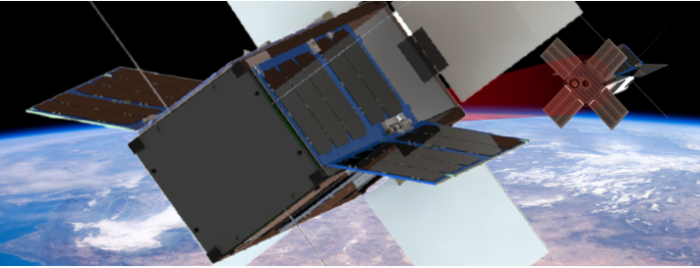ASU's DORA CubeSat to be aboard upcoming space station resupply launch

A simulated view of the DORA satellite deployed in low Earth orbit. In this view, its low frequency monopole has been deployed. Artist rendering courtesy NASA/ASU
NASA, Northrop Grumman and SpaceX are targeting a launch no earlier than 11:28 a.m. EDT on Saturday, Aug. 3, to deliver scientific investigations, supplies and equipment to the International Space Station.
Filled with more than 8,200 pounds of supplies, the Cygnus cargo spacecraft, carried on the SpaceX Falcon 9 rocket, will launch from Space Launch Complex 40 at Cape Canaveral Space Force Station in Florida. This launch is the 21st Northrop Grumman commercial resupply services mission to the orbital laboratory for the agency.
NASA's CubeSat Launch Initiative is also sending two CubeSats to deploy from the orbiting laboratory, CySat-1 from Iowa State University and DORA (Deployable Optical Receiver Aperture) from Arizona State University, making up ELaNa 52 (Educational Launch of Nanosatellites). The DORA CubeSat is led by ASU School of Earth and Space Exploration professors Daniel Jacobs and Judd Bowman.
The DORA CubeSat is a test bed for communications technology and future low-frequency radio astronomy projects. Wide field-of-view optical receivers are a proposed method for achieving high data rates on CubeSats without requiring precision pointing to aim a laser link telescope. Such receivers will use large arrays of wide-angle solid-state detectors, which have not been used much in space. DORA carries a solid-state photon detector that will be tested for performance and used to measure the background light from reflected sunlight, moonlight and city lights. The radio payload carries compact spectrometers spanning 50 to 200 MHz that are built using radio technology developed for ground-based 21cm cosmology experiments.
The DORA mission is supported by NASA’s SmallSat Technology Partnerships. The CubeSat was built and tested by students at ASU’s Interplanetary Initiative. The radio payload was built by ASU’s Low-frequency Cosmology Lab in the School of Earth and Space Exploration.
Live launch coverage will begin at 11:10 a.m. EDT and stream on NASA+, NASA Television, the NASA app, YouTube and the agency’s website.
This story was adapted from a NASA media briefing with contributions from ASU.
More Science and technology

Transforming Arizona’s highways for a smoother drive
Imagine you’re driving down a smooth stretch of road. Your tires have firm traction. There are no potholes you need to swerve to avoid. Your suspension feels responsive. You’re relaxed and focused on…

The Sun Devil who revolutionized kitty litter
If you have a cat, there’s a good chance you’re benefiting from the work of an Arizona State University alumna. In honor of Women's History Month, we're sharing her story.A pioneering chemist…

ASU to host 2 new 51 Pegasi b Fellows, cementing leadership in exoplanet research
Arizona State University continues its rapid rise in planetary astronomy, welcoming two new 51 Pegasi b Fellows to its exoplanet research team in fall 2025. The Heising-Simons Foundation awarded the…


